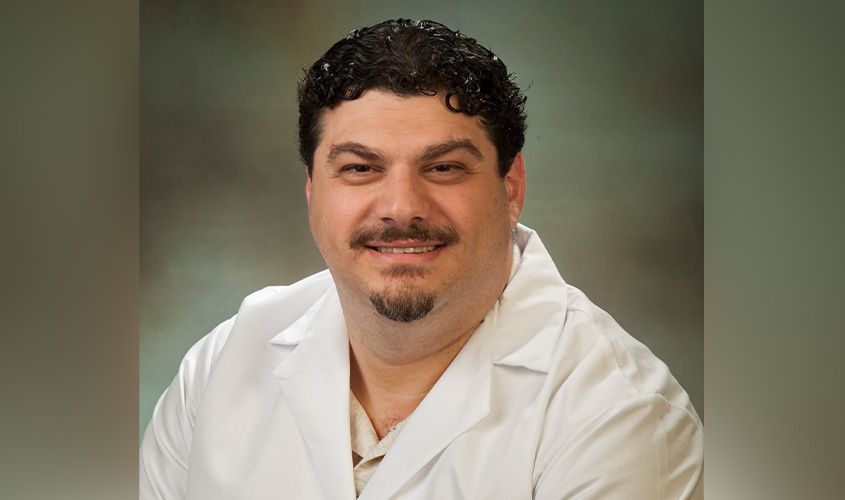
Mixed in with classes, exams, studying, and time to unwind, medical students have to squeeze in all-important sleep. Getting enough sleep, and implementing bedtime habits to do so, is a challenge not only for aspiring physicians but for everyone, this according to Sam Al-Saadi, MD ’05, the sleep medicine director at the University of Pittsburgh Medical Center (UPMC) Carlisle location, and assistant clinical professor of psychiatry for Penn State Health in Hershey.
According to the American Sleep Association, more than 50 million US adults have a sleep disorder, most notably insomnia and obstructive sleep apnea. Dr. Al-Saadi shared his perspective on what people can do to improve their sleep, and also the journey he took to lead the discussion in addressing the oft-ignored health crisis.
St. George’s University: How important is sleep to a person’s health?
Dr. Sam Al-Saadi: Sleep medicine is the secret of all secrets to good health. People have no idea how influential sleep is to the quality of their lives. To compensate, they pick up bad sleep habits, and they don’t believe that they need to fix them. The fact is that when they’re younger they can compensate, but when they get older, it just gets worse and they aren’t able to.
Sleep disorders are associated with each other. If you have one, you likely have another, whether it’s snoring, sleep apnea, insomnia, narcolepsy, or something else. The quality and quantity of sleep impact diabetes, cardiac disease, cerebral circulation, cognitive function, blood pressure, and other systems.
Sleep medicine is a subspecialty that has evolved from multiple specialties. It is a relatively new and evolving field. It started in psychiatry, moved to pulmonology and now includes neurology, ENT pediatrics, family medicine, and internal medicine.
SGU: What are some ways that people can improve their sleep?
Dr. Al-Saadi: Everyone can start by making a few minor adjustments that will make a big difference.
- Your bed should be for sleeping and intimacy only. Many people use an iPad or phone in bed or watch TV, but these are bad habits that can disrupt your sleep. If you don’t fall asleep within 10 minutes, you should get out of bed and come back later.
- A fixed wakeup time. Yes, it’s difficult for medical students and residents, but it’s good to have the same wakeup time, which will then dictate when you go to sleep.
- Be careful with caffeine intake. This can be cultural—you have people drinking tea at night, an energy drink to keep up with studying, coffee, or something with caffeine. The thing is, if you drink caffeine six hours before you go to bed, you still have half that caffeine in your body when you’re trying to sleep. Because of that, you’re more likely to have arousals—when you wake up for less than 30 seconds—that you aren’t even aware of. You may not be aware of these, but you’re likely to be more tired the next day.
- Limit long naps. Some people take long naps, but then you’re not going to be able to fall asleep later that night. Naps need to be just to catch up and keep you going for that day—no more than 30 minutes.
SGU: How did you make the journey from the UAE to the US and finally Grenada?
Dr. Al-Saadi: I was born and raised in the UAE. My dad was a microwave communications engineer, and my mom worked at the library, so I didn’t have any medical background in my family. When I came to the US at 17, I was on my own, had no money, and my English wasn’t very good. But I worked hard. I was taking courses to take the MCAT while working and supporting my family the entire time I was doing it.
I was a chemical engineering major at the University of South Florida, but when I got out, I just didn’t feel like I was using the skills I had learned. I was more fine-tuning things that were already set up. So I went and got a master’s in biomedical engineering and then when it came time to decide whether to go for an DO or MD, I went for an MD. I chose SGU because it had a lot of rotations in Florida and New York.
SGU: How was your experience in Grenada?
Dr. Al-Saadi: My experience was great. The campus was phenomenal, and I felt safe both on and off campus. We had a good time, and I think the students who came after me had it even better.
SGU: What advice would you give to a student entering medical school?
Dr. Al-Saadi: It’s important to have a plan for what you’re going to do after you graduate. It could change of course, but where you do your rotations will influence your path to residency, not only in terms of location of the residency but the individuals who you get your letters of recommendation from. I recommend that you have a plan, a backup plan, and overall a clear image in your mind of where you want to go with your career and how to get there.
– Brett Mauser

